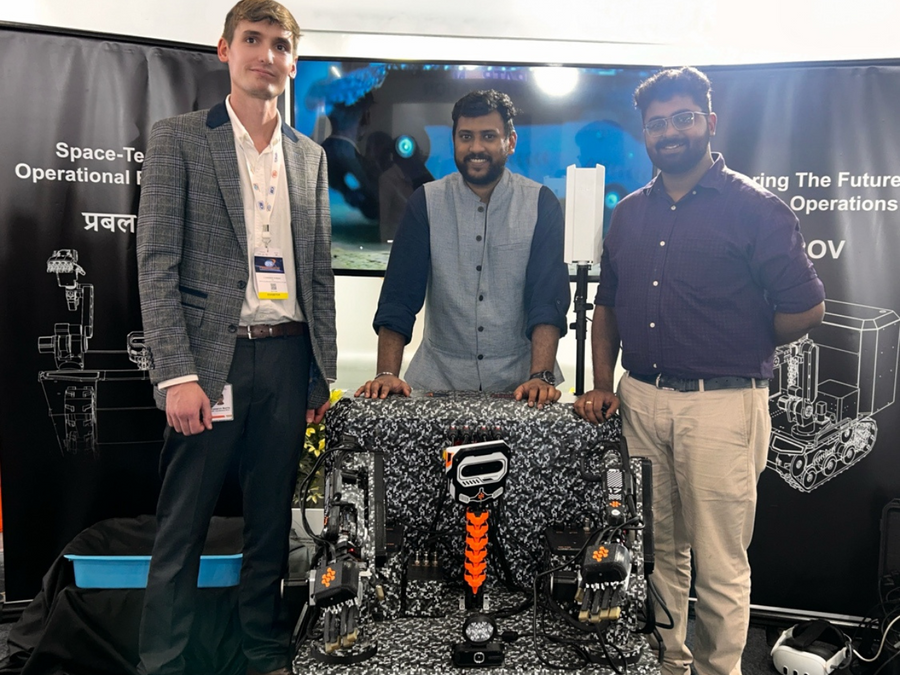Assistive technology startup Social Hardware raises Rs 3.2 crore led by Inflection Point Ventures

-
Funding and Growth Plans: Social Hardware, an innovation startup focused on assistive devices and robotics, secured Rs 3.2 crore in seed funding led by Inflection Point Ventures, with plans to enhance its marketing, R&D, and manufacturing capabilities.
-
Innovative Solutions: The startup specializes in teleoperated robotic systems for hazardous industries such as manufacturing, defense, and aerospace, aimed at improving safety and operational efficiency through advanced technology.
-
Expert Leadership: Co-founded by Abhit Kumar, Cameron Norris, and Raghavendran Arunachalam, the leadership team combines expertise in engineering, marketing, and product development, driving the company’s innovative solutions.
-
Market Potential: The global teleoperation and robotics market is projected to grow significantly, with a particular emphasis on safety in industries like aerospace and defense, indicating strong future opportunities for Social Hardware.
- Production Goals: The company plans to increase its production capacity from 12 units in FY 2024-25 to 36 units in FY 2025-26, targeting a revenue potential of Rs 24.76 crore in the near future.
Social Hardware, an inclusive innovation startup that designs and develops cutting-edge assistive devices, bionics, and field robotics, has raised Rs 3.2 crore in a seed funding round led by Inflection Point Ventures, a Gurugram-based angel investment platform.
The round also saw participation from Ivyleague Ventures and Soonicorn Ventures.
The startup plans to use the raised capital towards key growth and go-to-market (GTM) initiatives, building a strong marketing and sales team, establishing an advanced R&D facility, expanding in-house manufacturing capabilities, and strengthening R&D efforts.
What does Social Hardware do?
Social Hardware specializes in teleoperated robotic systems designed for hazardous operations.
The startup serves industries such as manufacturing, infrastructure, defense, and aerospace, delivering innovative solutions that enhance safety and operational efficiency in challenging environments.
Who are the founders?
Social Hardware was co-founded by Abhit Kumar (CEO), Cameron Norris (Chief Marketing/Management Officer), and Raghavendran Arunachalam (CTO).
Abhit, with a background in Instrumentation and Biomedical Engineering, has led the development of assistive devices, robotic systems impacting underserved communities and high-risk sectors like defense and aerospace. Cameron, an expert in social digital marketing, played a key role in scaling Wevolver, a global open-source hardware platform, to international success.
Raghavendran, with advanced degrees in Electrical Engineering, brings expertise in electronics system design, embedded systems, and defense-grade product development, driving the technical innovation behind Social Hardware’s robotic solutions.
Social Hardware’s market presence
Social Hardware said its strengths lie in its advanced, patent-pending teleoperation systems, featuring AR-controlled robots equipped with gesture-based control technology that improves safety and efficiency in hazardous environments. The startup’s intuitive interface enables precise remote control with minimal training, while twin modular end-effectors, including biomechanical hands and specialized tools, offer versatile solutions for a variety of mission-critical tasks.
Additionally, its mesh network technology ensures secure, reliable communication during operations, even in compromised environments, using AES-256 encryption and automatic data rerouting.
Social Hardware claims to have operate with a team of 17 across two locations in Bengaluru, including a corporate office in Hebbal and an R&D facility in Rajajinagar.
Currently, the startup has a production capacity of 12 units for FY 2024-25, which is set to triple to 36 units by FY 2025-26, aiming for a revenue capacity of Rs 24.76 crore.
Investor comments
Vikram Ramasubramanian, Partner, Inflection Point Ventures, said, “Technology went far and beyond in many sectors but remained untouched in some like manufacturing, defense, and aerospace where it still needs human intervention. The challenge of hazardous operations in these sectors has posed a long threat to safety, often limiting innovation and progress.”
“Social Hardware; with its teleoperated robotic system, addresses this critical issue by offering safer alternatives like robots that can be controlled remotely, removing the physical need of a human in a dangerous environment. With innovation that brings inclusivity to both sectors and society, Social Hardware is a pioneer that will bring out positive change in manufacturing, defense, and aerospace sectors,” Ramasubramanian added.
The global teleoperation and robotics market growth
The global teleoperation and robotics market is projected to reach $22.5 billion by 2026, growing at a CAGR of 12.5% from 2021-2026, driven by demand in industries like aerospace, defense, and industrial sectors for safer remote operations.
The Asia-Pacific region, including India, is expected to account for 18.36% of the global market, with India’s market growing at a CAGR of 13%, fueled by increasing demand in defense, manufacturing, and hazardous industrial applications. India’s robotics market, valued at $2.71 billion in 2020, is expected to reach $7.77 billion by 2027.
Here is a summarized list of the relevant details from the provided information regarding the startup Social Hardware:
Funds Raised
- Amount: Rs 3.2 crore
- Funding Series: Seed round
Investors
- Inflection Point Ventures (Lead investor)
- Ivyleague Ventures (Participating investor)
- Soonicorn Ventures (Participating investor)
Startup Details
- Name: Social Hardware
- Focus: Inclusive innovation startup designing assistive devices, bionics, and field robotics.
Founders
- Abhit Kumar – CEO
- Cameron Norris – Chief Marketing/Management Officer
- Raghavendran Arunachalam – CTO
Key Information
- Location: Bengaluru, India
- Team Size: 17 members
- Planned use of funds:
- Growth and go-to-market initiatives
- Development of a strong marketing and sales team
- Establishing an advanced R&D facility
- Expanding in-house manufacturing capabilities
- Production Capacity:
- 12 units for FY 2024-25, aiming to triple to 36 units by FY 2025-26.
- Revenue Target: Rs 24.76 crore for FY 2025-26.
Specialized Area
- Technology: Teleoperated robotic systems for hazardous operations
- Industries Served: Manufacturing, infrastructure, defense, and aerospace.
This encapsulates the main components of the funding round and the startup’s focus and leadership.
